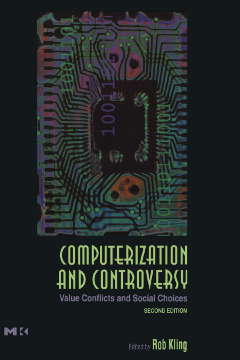
Additional Information
Book Details
Abstract
The Second Edition of Computerization and Controversy: Value Conflicts and Social Choices is a collection of 78 articles that examine the social aspects of computerization from a variety of perspectives, many presenting important viewpoints not often discussed in the conventional literature. A number of paired articles comprise thought-provoking head-on debate. Fields represented include computer science, information systems, management, journalism, psychology, law, library science, and sociology.
This volume introduces some of the major controversies surrounding the computerization of society and helps readers recognize the social processes that drive and shape computerization.
Division into eight provocatively titled sections facilitates course planning for classroom or seminar use. A lead article for each section frames the major controversies, locates the selections within the debates, and points to other relevant literature.
Key Features
* A fully revised and updated version of the first anthological treatment of the subject
* Organized to facilitate course planning for classroom or seminar use
* Provides coverage of the influence of computers on a wide variety of fields including computer science, information systems, management, journalism, psychology, law, library science, and sociology
* Includes discussion of the following issues related to computerization:
* Does computerization demonstrably improve the productivity of organizations?
* Should computer systems be designed to empower workers?
* Does electronic mail facilitate the formation of new communities, or does it undermine intimate interaction?
* Is computerization likely to reduce privacy and personal freedom?
"Computerization raises social, ethical, and moral questions--crises of values--in regard to privacy, intellectual property, governance, identity, social control, and education. This 945-page book collects the best research,theory, and journalism on technology and ethics Ive seen. Its numerous case histories go beyond the abstractions of armchair theory."
--Howard Rheingold, in WIRED
"Estimations, evaluations, and predictions of the effects of computerization on society have the polarizing force of religious differences...This book attempts to bring this complex, highly-charged conflict into the light of day and open examination. It succeeds admirably...Rob Kling serves as the editor, and he knows whereof he edits...The book achieves its overall purpose very well...Overall, this is a very well-executed anthology."
--Thomas A. Peters, University Libraries, Northern Illinois University, in THE JOURNAL OF THE AMERICAN SOCIETY FOR INFORMATION SCIENCE
"These essays raise important questions on how computers are transforming our jobs and social and professional relationships, threatening our privacy and much more."
--L.R. Shannon, The New York Times
"A collection of 47 previously published articles from diverse sources, presented in seven sections: the dreams of technological utopianism, economic and organizational dimensions of computerization, computerization and the transformation of work, social relationships in electronic communities, social control and privacy, security and reliability, and ethical perspectives and professional responsibilities. The editors provide a general introduction and detailed introductions to each section."
--SCITECH BOOK NEWS
"...a collection of thoughtful and critical views...Dont miss this highly recommended and thought-provoking book."
--David Bellin, Pratt Institute, Brooklyn SOCIAL SCIENCE COMPUTER AND REVIEW
"...the readings are well-chosen and the package is skilfully [sic] weaved together for teaching purposes. Each of the seven sections opens with a short analytical essay identifying the major issues to be covered and places the following articles in their theoretical and empirical context. It is an impressive text..."
--Tom Forester, THE AUSTRALIAN
